BOH VS MS Stock Comparison
Performance
BOH10/100
10/100
BOH returned -29.87% in the last 12 months. Based on SPY's performance of -0.37%, its performance is below average giving it a score of 10 of 100.
MS10/100
10/100
MS returned -10.16% in the last 12 months. Based on SPY's performance of 1.12%, its performance is below average giving it a score of 10 of 100.
Analyst Price Targets
BOH44/100
44/100
9 analysts offer 12-month price targets for BOH. Together, they have an average target of 0, the most optimistic target put BOH at 0 within 12-months and the most pessimistic has BOH at 0.
MS67/100
67/100
27 analysts offer 12-month price targets for MS. Together, they have an average target of 101.19, the most optimistic target put MS at 125 within 12-months and the most pessimistic has MS at 45.
Technicals
BOH93/100
93/100
BOH receives a 92 of 100 based on 14 indicators. 12 are bullish, 0 are bearish.
MS61/100
61/100
MS receives a 60 of 100 based on 14 indicators. 8 are bullish, 5 are bearish.
Earnings
BOH51/100
51/100
BOH has missed earnings 3 times in the last 20 quarters.
MS43/100
43/100
MS has missed earnings 3 times in the last 20 quarters.
Profit
BOH61/100
61/100
Out of the last 20 quarters, BOH has had 20 profitable quarters and has increased their profits year over year on 4 of them.
MS69/100
69/100
Out of the last 20 quarters, MS has had 20 profitable quarters and has increased their profits year over year on 7 of them.
Volatility
BOH50/100
50/100
BOH has had an average amount of volatility over the last 12 months giving it a score of 50 of 100.
MS46/100
46/100
MS has had a lower than average amount of volatility over the last 12 months giving it a score of 46 of 100.
All score calculations are broken down here to help you make more informed investing decisions
Bank of Hawaii Corp. Summary
New York Stock Exchange / BOH
Financial Services
Banks - Regional
Bank of Hawaii Corporation operates as the bank holding company for Bank of Hawaii that provides various financial products and services in Hawaii, Guam, and other Pacific Islands. It operates in three segments: Consumer Banking, Commercial Banking, and Treasury and Other. The Consumer Banking segment offers checking, savings, and time deposit accounts; residential mortgage loans, home equity lines of credit, automobile loans and leases, personal lines of credit, installment loans, small business loans and leases, and credit cards; private and international client banking, investment, credit, and trust services to individuals and families, and high-net-worth individuals; investment management; institutional investment advisory services to corporations, government entities, and foundations; and brokerage offerings, including equities, mutual funds, life insurance, and annuity products. This segment operates 54 branch locations and 307 ATMs throughout Hawaii and the Pacific Islands, and a customer service center, as well as through online and mobile banking. The Commercial Banking segment provides corporate banking, commercial real estate loans, commercial lease financing, auto dealer financing, and deposit products. It offers commercial lending and deposit products to middle-market and large companies, and government entities; commercial real estate mortgages to investors, developers, and builders; and international banking and merchant services. The Treasury and Other segment offers corporate asset and liability management services, including interest rate risk management and foreign exchange services. Bank of Hawaii Corporation was founded in 1897 and is headquartered in Honolulu, Hawaii.
Morgan Stanley Summary
New York Stock Exchange / MS
Financial Services
Financial - Capital Markets
Morgan Stanley, a financial holding company, provides various financial products and services to corporations, governments, financial institutions, and individuals in the Americas, Europe, the Middle East, Africa, and Asia. It operates through Institutional Securities, Wealth Management, and Investment Management segments. The Institutional Securities segment offers capital raising and financial advisory services, including services related to the underwriting of debt, equity, and other securities, as well as advice on mergers and acquisitions, restructurings, real estate, and project finance. This segment also provides sales and trading services, such as sales, financing, prime brokerage, and market-making services in equity and fixed income products consisting of foreign exchange and commodities; corporate and commercial real estate loans, which provides secured lending facilities and financing for sales and trading customers, and asset-backed and mortgage lending; and wealth management services, investment, and research services. The Wealth Management segment offers financial advisor-led brokerage and investment advisory services; self-directed brokerage services; financial and wealth planning services; workplace services, including stock plan administration; annuity and insurance products; securities-based lending, residential real estate loans, and other lending products; banking; and retirement plan services to individual investors and small to medium-sized businesses and institutions. The Investment Management segment provides equity, fixed income, liquidity, and alternative/other products to benefit/defined contribution plans, foundations, endowments, government entities, sovereign wealth funds, insurance companies, and third-party fund sponsors and corporations through institutional and intermediary channels. Morgan Stanley was founded in 1924 and is headquartered in New York, New York.
Power up your portfolio
Build a portfolio of your favorite stocks
Pluto makes it easy to build investing strategies and automate your portfolio
Compare Similar Companies
Compare BOH to other companies in the same or a similar industry.








